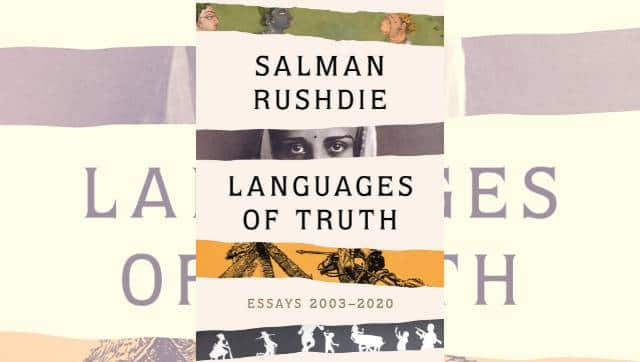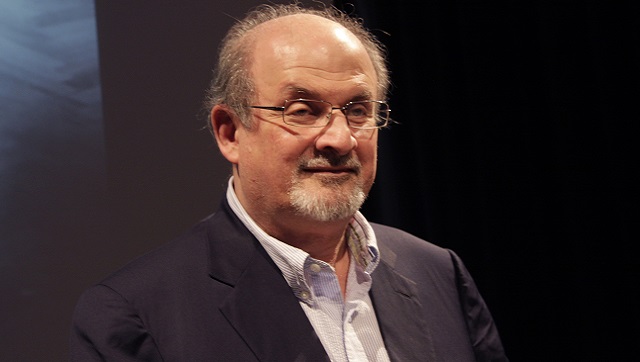How exciting, how tiring it is to read Rushdie. Within the space of two paragraphs he will cite The Matrix, Being John Malkovich, the “delicious narcissism” of artist Francesco Clemente’s portraits, the “Hindu insistence” of Tat Tvam Asi from the Chandogya Upanishad, Noam Chomsky, and 13th century Italian philosopher Aquinas. Sometimes he will just throw the name in, without providing context of who they are or what they did to deserve this mention. It is easy to feel fatigue, because in the midst of this swirling mass-mess of references, there is rarely a profound point being made. Often, it’s just deeply felt platitudes. Languages Of Truth is a collection of Rushdie’s essays and speeches made between 2003-2020 on a variety of subjects — literary, artistic, political. Despite the sprawling nature of the text, many of the essays circle back to language and truth, showing Rushdie’s preoccupations with both, these past two decades. The collection goes from Shakespeare and Cervantes (whose Don Quixote he mined, to produce his hypnotic Quichotte, shortlisted for the Booker Prize in 2019), to Bhupen Khakhar and Amrita Sher-gil. There is even an aside on Osama Bin Laden. The eclectic collection fronts Rushdie as someone immersed in the world of art — French New Wave cinema, South American magic realism, British and New York “high-culture”, contemporary photography, post-colonial fine art. It produces the impression of a man, who in another world, might have been a critic honing instead of his luxuriant takes, a more gin-clear sense of art. There is an ether-like quality to his characterisations, many of which were meant to be read out in speeches. So their rousing effect, especially the convocation speeches, that would have come from the cadence of Rusdhie’s voice have a rather grating flatness when being read. I get it, this book isn’t a distillation of Rushdie at his best. It is an archive of all his non-fiction (as in other than fiction, but also, yes, not fiction) work, and like any archive it brings out, sandpapered and exposed edges alike, a sense of Rushdie’s uneven genius. But the central driving force of this archive, an idea of truth, is so pat and unoriginal, that even at its best, the essays work only when they are cloaked in his witty, charming voice. There is a paradox around which the book is woven — the word ‘truth’ keeps appearing, as it should be given the title, with widely varying interpretations. Sometimes he uses it as a romantic literary idea — that at the heart of storytelling must be truth. He sometimes uses the word essence, but doesn’t bother explaining with any critical rigour what literary truth, literary essence is. But then sometimes he uses truth in the more literal, objective sense, as the opposite of lies. He uses these mostly in a political context — Trump’s war on truth, Modi’s allergic reactions to it. This gives truth itself a multi-dimensional quality, where the two definitions are almost contradictory, one assuming the objective, one reliant on the subjective; that there can be many truths kind of defeats the purpose of having truth as the opposing binary to lies. Rushdie tries to brush over this by citing the opening lines of Harold Pinter’s Nobel Prize acceptance speech, where, as a writer he holds onto the idea that “a thing is not necessarily either true or false; it can be both true and false”, and yet as a citizen he cannot do this. What is this division between literary and civic truth? No answer. The political untruths are easier to discuss because there is something objectively wrong with that. It can be proven, fact checked, and after a point it becomes a matter of belief. But this is rarely what he is talking about. And when he does, he rarely, if ever, brings fresh perspective, unbridled rage, or innovative phrasing. [caption id=“attachment_9744181” align=“alignnone” width=“640”]  Rushdie’s Languages of Truth[/caption] Literary truths and untruths are the issue here. Because it almost seems like he is pontificating about writing in the abstract, instead of speaking of that elusive, frustrating moment of creation when thoughts become words. He is almost shackled by this idea of “truth”, as if he is afraid to say “Write because you fucking love it”, instead fashioning this curious and eventually tiresome vortex of reason to explain good literature, good writing. This might be because his entry point in a lot of the essays is the “writer’s reading mind” and not the writer’s writing mind, so he is speaking “not so much as a writer but as a reader”. This explains the platitudes, because it is easy to think of impressions, politics, the larger insistence on meaning, when you excise from literature the labour of writing. This blind spot feels all the more apparent when in a chapter titled “Adaptation” he goes to great lengths citing exhaustive lists of good adaptations and bad adaptations, but he refuses to get into the weeds describing what entails the goodness or badness of an adaptation. He uses the word “essence” in passing to explain it and then lugs on. He talks briefly about the stage adaptation of Midnight’s Children but even here, his focus is more on the reception of it, not the production of it. That he even refuses to bring up the unfortunate film adaptation of Midnight’s Children by Deepa Mehta whose screenplay he co-wrote, says everything that needs to be said about it. Rushdie wants things which “[enrich] and [enlighten] your reading of the novel”, and gossip on the author’s life doesn’t count. He is not fond of the auto-fiction genre, despite noting some brilliant additions to it, and despite noting that truth is of utmost importance in literature. He prefers the “act of imagination”, of taking something familiar as clay, and potting it into something unbelievably unfamiliar, yet, of course, truthful. (But he is also — despite being a champion of imagination — oddly unable to suspend disbelief. In his tiring, familiar critique of Slumdog Millionaire, when noting how a boy from the slums makes it to Kaun Banega Crorepati, he asks in parenthesis, “how?”.) Under the hypnotic allure of pontification, he will say silly things like language is the essence of Gabriel Garcia Marquez’s work. He doesn’t bother explaining with clarity what he means by essence and what he means by language — the translated English or the original Spanish or something more abstract? The kind of imprecision that can be forgiven coming from a celebrated writer of fiction. But, even otherwise, it is easy to forgive Rushdie for these exaggerated notions of art and truth, for often, under the thrall of great literature, sublime cinema, rousing photography, gut emptying strokes of impressionist paintings, it is easy to believe art is more than it is, it is easy to believe that “art alone than make possible the transaction between love and death that is at the centre of human life”, and while articulating art, it is easy to say things we don’t entirely mean, because we have realised by then that the process of articulating awe and beauty is as pointless an exercise as any. There can only be approximations of precision when trying to explain the visceral. But Rushdie doesn’t even attempt an approximation, content with the brushstroke truisms. How does one react to statements like “the truth will set us free” or “at its very best, [art] is a revolution”? The former oddly comes at the end of a chapter when he’s complaining about the “censorious age” where calls of accountability against “offending people’s sensibilities” is like “the old religious apparatus of blasphemy, Inquisition…”, when he chooses to champion rocking the boat with offensive takes over an empathetic worldview that takes into account historic violence and present privilege. The book sparkles to life in the moments when Rushdie speaks of people he knew, almost as if the dignity of having them present in his life allows him to let go of the need to distract us with his prose, which is, it must be noted, very distracting. (This distracting quality is part of the allure and labour of reading Rushdie, the long sentences sparkling with wit, charm, and a forced sense of citations, that makes reading him — fiction or non fiction — like you’re wilfully lugging a glittering Sisyphean rock.) It is here, when he’s narrating his life and the people it has shared space and love with, that we get a sense of the discerning companion that Rushdie is. His essay on Carrie Fisher and her struggles with mental health, brief, has such a lasting impact I had to halt at the seams before moving onto the next essay. At his best, he brings with his affection, nostalgia that doesn’t cloy or clot. Rushdie is, faults and everything, a fine find of post-colonial literature. The fact that he values and loves “literature, freedom, irreverence, freedom, irreligion, freedom”, a unique blend of the intellectual quests and movements of the latter half of the 20th century with the enduring presence of the written word that calcifies these shape-shifting beliefs of each cascading generation, shows that he is as much a challenge as he is a champion. He inheres a moral clarity that is so certain of itself that it rarely finds an excuse to introspect. This certainty leaks into his impressions of art, so militantly clear that it must have as its seed a germinating truth, a fermenting essence, that it even forgets to ask, after all, what is truth?
Languages Of Truth is a collection of Rushdie’s essays and speeches made between 2003-2020 on a variety of subjects — literary, artistic, political.
Advertisement
End of Article


)
)
)
)
)
)
)
)
)



